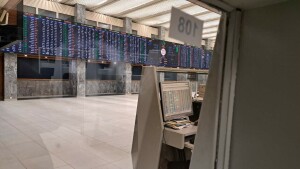The Indonesian rupiah hit three-week lows against the dollar on Wednesday in otherwise calm currency markets in Asia as investors held their bets ahead of the release of minutes of the Federal Reserve's last meeting and euro zone inflation data.
The US dollar was broadly steady, staying near 9-year highs versus the euro but recovering some ground it lost to the safe-haven yen earlier this week.
While investors waited for euro zone inflation data to confirm their dovishness on ECB monetary policy, there was little sign of a shift in the trends that have dominated the first few trading sessions of 2015, namely, a strong dollar, falling global bond yields, tumbling oil prices and a selloff in emerging markets.
Oil prices remained near five-and-a-half year lows in early Asian trading on Wednesday, driven by mounting worries about a global supply glut, with US futures under $48 per barrel.
Markets are also looking out for the minutes of the Fed's last policy meeting, which are due later Wednesday and may offer some clues on where members felt US rates were heading.
The ringgit, which has felt the most pressure in Asia on concerns about the impact of tumbling oil prices on Malaysia's trade and fiscal balances, won brief reprieve after Wednesday's trade data for November showed surprisingly strong export growth and the biggest trade surplus since October 2011.
The currency, Asia's weakest in 2014, pulled up to 3.5550 per dollar, off 5-1/2-year lows of 3.5850. Besides its vulnerability to falling oil prices, investors have more recently also been concerned about the heavily indebted state fund 1 Malaysia Development Bhd (1MDB).
A 15-year Malaysian government bond issue on Wednesday also received bids for more than twice the amount auctioned, relieving market fears about capital outflows in a country where nearly half the outstanding government debt is owned by foreigners.
Analysts at Morgan Stanley said they expected the ringgit to touch lows of 3.7 per dollar, last seen during the 2008 financial crisis.
However, the re-emergence of doubts about US growth momentum might be behind the reluctance to push the dollar any higher, analysts said.
"It may still be too soon to establish short dollar positions vs. emerging markets, in part because emerging market growth remains severely challenged too, but investors should be selective with long dollar trades," Citi strategist Siddharth Mathur said in a note. He recommended relative value trades, such as being long the Korean won versus the Taiwan dollar or being long Thai baht against the ringgit.
BR100
15,115
Increased By
28.1 (0.19%)
BR30
43,048
Increased By
175.6 (0.41%)
KSE100
149,493
Increased By
257.8 (0.17%)
KSE30
45,518
Increased By
11.6 (0.03%)























Comments
Comments are closed.